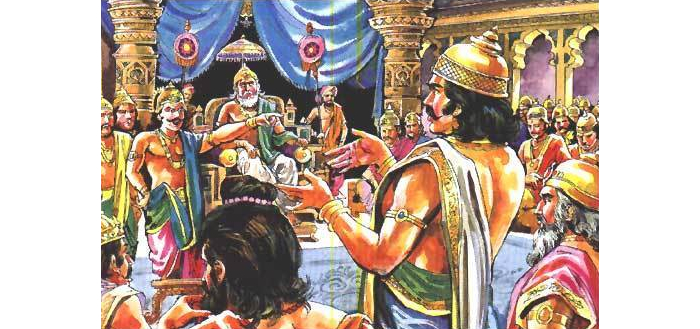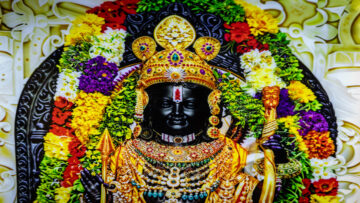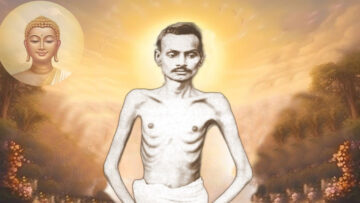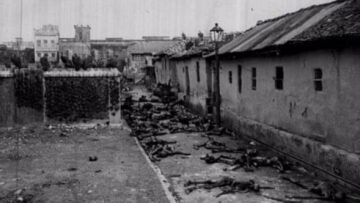The Udyoga Parva of the Mahabharata is one of the greatest manuals on diplomacy, statecraft and ethics that one can come across. It acts as the final checkpoint before the great cataclysm at the fields of Kurukshetra.
After the marriage ceremony of Abhimanyu and Uttara, the Pandavas, along with their allies, deliberated on their next course of action to get their kingdom back. At the same time, back in Hastinapura, the elders of the Kuru clan – Dhritarashtra, Vidura and Bhishma all grappled with the same dilemma, knowing fully well that Duryodhana had no intent at all of restoring their land back to the Pandavas. We see increasingly desperate attempts to avert the approaching disaster by stalwarts on both sides of the divide, yet there is a pervasive sense of inevitability borne out by the understanding that Duryodhana, under the advice of Shakuni and Karna, was intractable in his desire for war.
We also see the various Kings across Bharatvarsha declare their support for either Yudhistira or for Duryodhana. In one really interesting episode, Shalya, the King of Madra, is tricked by Duryodhana to fight on his side against his own nephews. Despite great regret, he is unable to break his personal commitment to which he was maneuvered to by the Kaurava side.
The narrative driver for this portion of the epic is the back-and-forth diplomacy that preceded the Great War. Envoys are sent from both Yudhistira’s camp at Upaplavya and Dhritarashtra’s court at Hastinapura, until finally Shri Krishna himself decides to go to the Kuru court for the sake of peace. Before he leaves, Vasudeva questions each individual Pandava and Draupadi about their desire for war or peace.
Two responses stand out. Firstly, Bhimasena adopts a conciliatory tone and tells Shri Krishna to sue for peace with Duryodhana – agreeing to follow the latter and be under his control so that the family is not destroyed! Later, in the same section, Sahadeva says that even if all his elder brothers wanted peace, he himself would never agree to it, and if need be, would fight Duryodhana alone!
As we all know, Duryodhana was unwilling to be satisfied with just the kingdom. Slave to his own pride, jealousy and avarice, he desired nothing short of the total annihilation of the Pandavas. Egged on by his evil advisors, he rebuffed every conciliatory gesture from the Pandavas, every bit of good counsel from his elders and every warning from Shri Krishna.
The final peace mission thus collapsed and the beating drums of war began the countdown to the upcoming reckoning.
The entirety of the Mahabharata story can be divided into three broad narrative blocks-
1. The antebellum period set in a grand, vibrant yet internally decaying society filled with larger than life characters
2. The 18 day war at Kurukshetra where all established rules of society collapse in a graphic spiral of violence
3. The post war reconstruction period, in which there is acceptance of a diminished reality tinged with sorrow at the passing of the heroic age
Kautilya Chanakya, in his treatise Arthashastra, writes about the concept of Matsya Nyaya, or the Law of the Fish. As per Indian political thought, the ideal society is bound by Dharma (in this context, righteousness). The King (or the ruling entity) has the duty to be the ultimate protector of Dharma for maintaining a stable social order. When the King fails to chastise the wicked, they get emboldened and torment the weak. This leads to the collapse of morality and a return to the pre-civilization ethos of the strong eating the weak at will. Thus, being a King in Indian political context means being responsible for the duties that are associated with the institution of Kingship.
The origins of the great tragedies in Mahabharata can be traced to Kings forgetting that their institutional responsibilities and succumbing to their individual desires. When King Shantanu succumbed to his desire for Satyavati, he created a succession crisis. When King Yudhistira succumbed to his gambling addiction, he lost both his kingdom and his family. Finally, when King Dhritarashtra succumbed to his love for his children, he allowed his own clan to be torn apart by Duryodhana and his cronies. In each case, the individual failed the institution, and the cost of these personal failures were borne by the state and its subjects.
At this point, it is very important to remember that the absence of Matsya Nyaya is not the absence of violence, or vice versa. Indian political doctrine does not accept the peace of the graveyard. While it recognizes the horrors of conflict, it also understands that sometimes force is needed for the sake of justice. It rejects the notion of a “blanket” ahimsa that allows evil to prosper individually or structurally. Empress Draupadi says this to Shri Krishna,
“O Janardana! Those who know dharma know that while it is a sin to kill someone who should not be killed, it is also a sin not to kill someone who should be killed.”
All the Pandavas understand that Duryodhana is an evil man. They also know that they have justice on their side. However, they have a clear understanding of the cost of pursuing that justice. To avoid the destruction of the Kuru clan and the larger kshatriya samaaj in India, most of them advocate peace, even though it may come at great personal cost. This is an institutional, non-disruptive way of looking at the situation.
The Kaurvas on the other hand represent extreme individualism. Nothing matters to Duryodhan apart from his personal enmity with the Pandavas. Nothing matters to Karna apart from his rivalry with Arjuna. Nothing matters to Shakuni than the cutthroat political games in pursuit of absolute power. For them, their own personal desires were indistinguishable from the welfare of the state.
Thus, we arrive at a situation where one side is hyper aggressive, wishing to put everything at stake to attain total domination. The other side, although powerful, is willing to make compromises keeping in mind the larger society.
This is the moral polarity that ultimately makes war inevitable.
However, it must be remembered that the Pandavas, though willing to make a compromise, were doing it from a position of strength. In Arjuna and Krishna, they had the only two people in Aryavarta truly capable of annihilating the world. They understood their power, and hence were circumspect. As Yudhistira tells Sanjaya,
“Let all of us live happily in peace. O Sanjaya! I am as ready for peace, as I am for war. For the sake of dharma and artha, I can be mild. But I can also be terrible.”
Conversely, drunk in their self-inflicted delusion, Duryodhana, Karna and Shakuni overestimated their own power, and underestimated the Pandavas. They laughed off all evidence of Arjuna and Bhimasena’s prowess. Ignoring reality, they remained recalcitrant and doubled down on their extreme, zero sum position.
We see reflections of these behaviors even today. Even in the democratic political space, we come across people who would subvert and destroy their own country if they do not get to rule over it. We see those who would refuse to coexist with political rivals, try every trick in the book to insult and humiliate them in public, and then exile them to the wilderness – away from public life, their voices suppressed, their identities distorted…
They too are proud; they too think of ruling as a birthright. They too overestimate their power and rush headlong into internecine conflict just because they can.
When this mentality becomes all pervasive in the political spectrum, institutions get corrupted. Righteousness and truth become subservient to the pursuit of power. A Duryodhana becomes a corrupting influence even on those who originally possess a sense of morality. A Shalya is tricked to side with evil. A Balarama refuses to take a side and departs for pilgrimage.
What justice can a Dhritarashtra assure his subjects when he is unable to control the rapacity of his own son? What security can a Duryodhana provide when he is a slave to the basest of instincts in his personal capacity?
In this manner we end up in a situation of anarchy where the institutions are either powerless or actively Adharmic. When no one is left to uphold Dharma, Matsya Nyaya takes hold in society.
Mahabharata tells us how to escape this fate.
The Pandavas, in their period of exile, understood the hardships borne by common people. They gained a new perspective on something as fundamental as the difficulty of arranging enough food supplies for those dependent on them. Arjuna, through his austerities, managed to win the favour of Mahadeva himself and gain the ultimate weapon, Pashupata. During their year of staying incognito, they successfully encountered the challenges that many of us face even today – a temperamental boss, sexual harassment by the powerful, nepotism, artificial limits on one’s potential. In this manner, the Pandavas actually grew in strength by treating their exile as a form of tapas.
Those very same experiences taught the Pandavas about the need of self-restraint for the powerful. That is the reason why Bhimasena, who wanted to break the terms of the dice game and go to war immediately at the beginning of their period of exile, spoke with great sensitivity after the same exile about the necessity to avoid bloodshed. This does not mean that he was afflicted by cowardice or had become weak, rather it implies a broadening of perspective and refusal to look at the world in an us vs them binary.
This growth in character is what allowed the Pandavas to have the clarity to first sue for peace instead of being driven by revenge. This is what led them to have the clarity that the chance of an honest compromise had to be pursued for the greater good regardless of their personal opinions about Duryodhana. In addition, this growth in character allowed them to reject Dhritarashtra’s vacuous offer of peace without any compromise or consequence for Duryodhana, and ultimately face their own family on the battlefield.
Will the Bharatvarsha of today come under the sway of Matsya Nyaya?
The answer, as always, depends upon us – as individuals and as part of social, economic and political institutions.
Only those who have gathered strength and clarity through tapas can challenge the forces of Matsya Nyaya. Only tapas can give someone the courage and conviction to enter the battlefield of the Kurukshetra and annihilate evil. Only by undergoing tapas will we finally see the restoration of a Dharmic society.
What was true at the time of Mahabharata is true for us even today. The coming days, months and years would tell us which way our own destiny will swing.
(Image credit: gloriushinduism.com)
Disclaimer: The opinions expressed in this article belong to the author. Indic Today is neither responsible nor liable for the accuracy, completeness, suitability, or validity of any information in the article.










